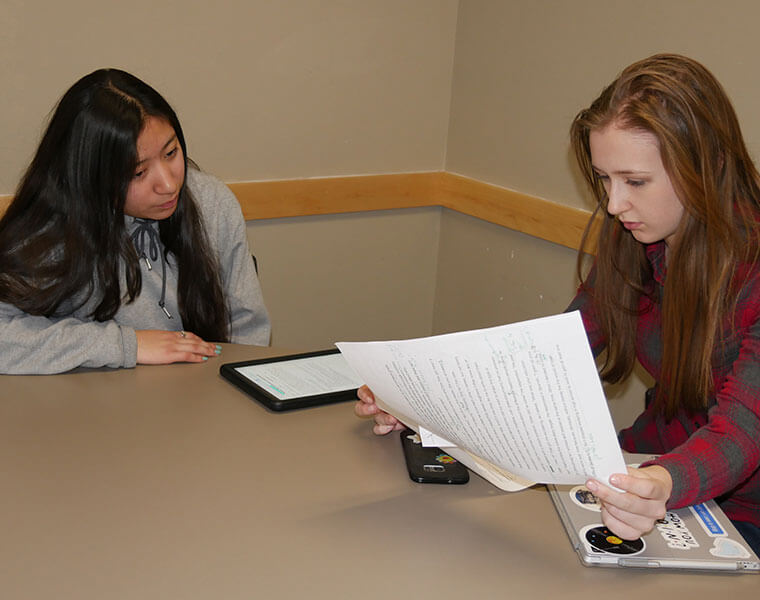It’s the last 30 minutes of the school day, the time at Colorado Academy set aside for students to meet with teachers and receive additional help. Miriam Rojo-Gutierrez is sitting in a small office, intently studying her ninth grade journalism paper on the book Enrique’s Journey.
“What do you think of my transitions?” she asks.
“Actually, I think they’re pretty good!” That affirming reply comes not from Rojo-Gutierrez’s English teacher at CA, but instead from Junior Katie Murphy. Murphy is one of five upperclassmen Writing Fellows who staff the Writing Center, a place where students can receive additional help with their writing from peers.
“As a freshman, I did papers similar to this one, so I can relate to this assignment,” Murphy says. “I like feeling that I am helping her!”
‘Practice…before they get to college’
In its second year, the Writing Center is the brainchild of Upper School English teacher Kathleen Law. She set up the Center so that students can visit it on the four days of every six-day cycle designated as “Help Days,” with different Writing Fellows alternating each day. (The remaining two days in the cycle are set aside for club meetings.)
The Center is an alternative to relying solely on teachers for tutoring in writing. Law believes it’s good preparation for college.
“College students can’t go to consult with a professor every day about their writing, but they can go to their Writing Center,” Law says. “They need to practice and train themselves to use that resource before they get to college.”
Law also believes that some students find peer consultation particularly valuable, not only because it might be less intimidating than talking with a teacher, but also because students who do wait until the last minute can think through an idea in the Writing Center if their teacher is busy helping other students at that time.
Murphy, who discovered her talent for coaching writers during peer review sessions in English class, testifies to occasional procrastinators seeking help. One student came to her with a “six-page list of bulleted points” and asked for help writing a paper that was due the next day. “I said, ‘Honestly, I can point you in the right direction, but you are going to be up very late,’” Murphy remembers. “I’ve been that person, so I knew what to say.”
‘The better I will do’
The Writing Fellows undergo specialized training and, Law says, learn “not to give away their intellectual property.” They are not copy editors; instead, they can underline or circle errors they find.
Murphy suggests to Rojo-Gutierrez that she rewrite a section of the paper to connect her points to “the bigger picture.”
“You need to find the ‘So what?’” she advises.
Rojo-Gutierrez listens attentively and takes notes. She transferred to CA from a middle school where, she says, the teachers were always busy and there was little extra help available.
“At CA, I get more advice and feedback, and that’s something I need,” she says. “The more information, the more eyes on my work, the better I will do.”
Law hopes that teachers will receive better and cleaner writing because students are using the Writing Center and receiving writing intervention earlier and more frequently, before it gets to be the last minute and “panic sets in.”
“Students realize how powerful this resource is,” Law says. “I hope they will continue to use Writing Centers when they get to college.”
As for Murphy, serving as a Writing Fellow has had an unexpected consequence. She finds that she is more willing to seek help in courses where she needs it. “Now I don’t feel like a vacuum asking for help,” she says. “That’s because I’m also giving help.”
